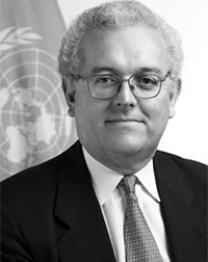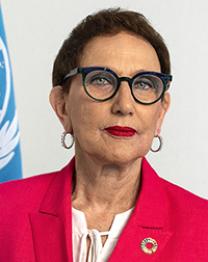Speakers
- Prof. José Antonio Ocampo, School of International and Public Affairs, Columbia University
- Prof. Célestin Monga, John F. Kennedy School of Government, Harvard University
- Prof. Isabella Weber, University of Massachusetts Amherst
- Prof. James K. Galbraith, Lyndon B. Johnson School of Public Affairs and Professorship in Government, University of Texas
Moderator
- Ms. Rebeca Grynspan, UN Trade and Development Secretary-General

José Antonio Ocampo is director of the Economic and Political Development Concentration in the School of International and Public Affairs, Member of the Committee on Global Thought and co-President of the Initiative for Policy Dialogue at Columbia University. He is also the Chair of the Committee for Development Policy, an expert committee of the United Nations Economic and Social Council (ECOSOC). In 2012–2013 he chaired the panel created by the IMF Board to review the activities of the IMF’s Independent Evaluation Office; in 2008–2010, he served as co-director of the UNDP/OAS Project on “Agenda for a Citizens’ Democracy in Latin America”; and in 2009 a Member of the Commission of Experts of the UN General Assembly on Reforms of the International Monetary and Financial System.
Prior to his appointment, Ocampo served in a number of positions in the United Nations and the Government of Colombia, most notably as United Nations Under-Secretary General for Economic and Social Affairs; Executive Secretary of the Economic Commission for Latin America and the Caribbean (ECLAC); Minister of Finance and Public Credit, Chairman of the Board of Banco del República (Central Bank of Colombia); Director of the National Planning Department (Minister of Planning); Minister of Agriculture and Rural Development, and Executive Director of FEDESARROLLO.
Ocampo has published extensively on macroeconomic theory and policy, international financial issues, economic and social development, international trade, and Colombian and Latin American economic history.

Dr. Célestin Monga is professor of public policy (economics) at Harvard’s Kennedy School of Government. He is also Faculty Associate at the Center for International Development at Harvard University and Fellow at the Harvard University Center for African Studies.
Since 2016, he has also been part-time Professor of Economics at the University of Paris, Panthéon-Sorbonne and Research Professor at Peking University’s Institute of New Structural Economics.
Prior to his current life in academia Monga held various board and senior executive positions in academia, financial services, and international development institutions, serving most recently as Managing Director at the United Nations Industrial Development Organization (UNIDO), Vice-President and Chief Economist of the African Development Bank Group, and Senior Economic Adviser/Program Director at the World Bank Group.
Monga has published extensively on various dimensions of economic and political development. His books have been translated into several languages and are widely used as teaching tools in academic institutions around the world.
Dr. Monga holds graduate degrees from MIT, Harvard University, and the Universities of Paris and Pau.
Isabella Weber is an Assistant Professor of Economics and the Research Leader for China of the Political Economy Research Institute at the University of Massachusetts Amherst.
Previously she was a Lecturer at Goldsmiths, London. She holds a Ph.D. in Development Studies from the University of Cambridge and a Ph.D. in Economics from the New School of Social Research.
Isabella is the author of “How China Escaped Shock Therapy: The Market Reform Debate” and has written on the economics of China’s rise, neoliberalism and neoliberals in China, the US-China trade imbalance and theories of money.

James Kenneth Galbraith is an American economist. He is currently a professor at the Lyndon B. Johnson School of Public Affairs and at the Department of Government, University of Texas at Austin. He is also a Senior Scholar with the Levy Economics Institute of Bard College and part of the executive committee of the World Economics Association, created in 2011.
Galbraith holds degrees from Harvard University (BA) and in economics from Yale University (MA, M.Phil, PhD). He was Executive Director of the Joint Economic Committee of the United States Congress in the early 1980s. He chaired the board of Economists for Peace and Security from 1996 to 2016 and directs the University of Texas Inequality Project. He is a managing editor of Structural Change and Economic Dynamics.
In 2010, he was elected to the Accademia Nazionale dei Lincei. In 2014 he was co-winner with Angus Deaton of the Leontief Prize for Advancing the Frontiers of Economics. In 2020 he received the Veblen-Commons Award of the Association for Evolutionary Economics.
In September 2021, Rebeca Grynspan was appointed Secretary-General of the United Nations Conference on Trade and Development (UNCTAD), becoming the first woman to lead the organization in its 60-year history.
Rebeca Grynspan, an economist and former Vice President of Costa Rica, is an experienced leader of international institutions with a substantive track record in government, UN diplomacy, economic policy and multilateral cooperation at the global level.
Prior to joining the United Nations, she was Vice President of Costa Rica and held cabinet positions as Minister of Housing, Minister Coordinator of Economic and Social Affairs and Deputy Finance Minister.
Previously, she served as Secretary-General of the Ibero-American Conference (2014–2021), chairing regional summits of Heads of State and Government; United Nations Under-Secretary-General and Associate Administrator of the United Nations Development Programme (UNDP); and UNDP Regional Director for Latin America and the Caribbean. She was a member of the UN Commission for the Reconstruction of Haiti, representing the UN Secretary-General.
At UNCTAD, Grynspan has been at the centre of critical negotiations to address global trade and development challenges. She played a decisive role in the successful Black Sea Grain Initiative brokered between the UN, Türkiye, the Russian Federation and Ukraine, which enabled the safe export of over 32 million tons of grain, lowered global food prices by 22% and prevented millions from falling into food insecurity. She also leads the UN Global Crisis Response Group on food, energy and finance, and has represented the UN in G20 summits.
Her leadership has been recognized widely. In 2024, she received the Doha Negotiator of the Year Award for spearheading UN efforts to restore Black Sea trade routes. In 2025, Spain’s Ministry of Foreign Affairs, European Union and Cooperation awarded her the inaugural Isabel Oyarzábal Women in Multilateralism International Prize for her contribution to multilateralism.
Ms. Grynspan holds degrees in economics from the University of Costa Rica and the University of Sussex, and honorary doctorates from several European universities.




